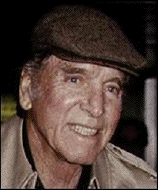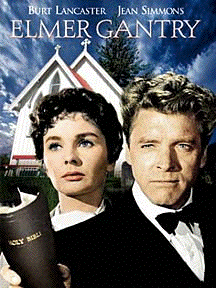November 2: Burt Lancaster
Burt Lancaster (1913)
It was on this date, November 2, 1913, that American actor Burt Lancaster was born Burton Stephen Lancaster, one of five children, in New York City. Lancaster had a tough life on the streets of New York and attended a Protestant church. There he was strongly influenced by its pastor and the seeds of his liberal humanitarianism planted. He grew to stand 6'2" tall (188 cm) with blue eyes and unruly hair.
Lancaster used his athletic skills first as a circus performer, then as a soldier in World War Two, which is where he discovered the USO and got his first taste of acting. His skills were self-taught and he learned the ropes by trial and error, but his 1946 film The Killers, based on a story by Ernest Hemingway, demonstrated his star quality playing the mysterious "Swede."
Lancaster went on to make the thriller Sorry, Wrong Number (1948), the swashbuckling Crimson Pirate (1952), a drunken, brooding ex-doctor in Come Back, Little Sheba (1952) a tough Army sergeant in pre-war Pearl Harbor in From Here to Eternity (1953) – in which he shared that beachside love scene with Deborah Kerr – the title role in The Rainmaker (1956), Wyatt Earp with long-time pal Kirk Douglas as Doc Holliday in Gunfight at the O.K. Corral (1957), steely columnist J.J. Hunsecker in Sweet Smell of Success (1957), and the first officer to scheming submarine captain Clark Gable in Run Silent, Run Deep (1958). His later roles were marginal, but occasionally memorable, such as Archie "Moonlight" Graham in Field of Dreams (1989). But Lancaster's most famous role would have to be Sinclair Lewis' fire-and-brimstone evangelist/con artist in the 1960 film Elmer Gantry. In the title role, Lancaster won not only a Best Actor Oscar, but a Golden Globe, and the New York Film Critics Award.
Not surprisingly, Elmer Gantry had some difficulty navigating past the Production Code film censors. Catholics generally had little trouble with the title character, because his portrayal was only critical of Protestant fundamentalists, leaving Roman Catholics feeling smugly moral. And Elmer Gantry didn't criticize religion, per se; instead, it criticized religious charlatans. The implied sexual relationship between Elmer and Sister Sharon Falconer caused the Catholic Legion of Decency to give it a "B," a restricted rating, allowing no children under 16. As for the Protestant reaction, their churches hated it for the same reasons the Catholics liked it.
What were Burt Lancaster's own thoughts on religion? Bearing in mind that an actor is trained and paid to be someone he is not, it is unfair to assume that Lancaster thought of religion in the same way as his con-man character. Although she fails to explain how or why, biographer Kate Buford says Lancaster "left religion behind in East Harlem."*
In preparing for his first major TV role, Moses the Lawgiver (1975), Buford says Lancaster read the Old Testament and the 40-page article on Moses in the Encyclopedia Britannica. When asked by a reporter if he would now become typecast like Charlton Heston (who played Moses, in The Ten Commandments, almost 20 years earlier), Lancaster tartly retorted, "If Charlton was trapped in biblical films, it was his own fault – he accepted the limitation."** About the time the mini-series was broadcast, an article in TV Guide magazine quoted Lancaster as saying he was an Atheist.
However, Jackie Bone, his companion of 14 years (it was assumed they were lovers), refused to believe that Lancaster was an Atheist, as he claimed. "Something happened, somewhere," she guessed, "perhaps his mother's death – to turn him off" to religion.** Buford has to admit that Lancaster "tossed off any such identification. The Ten Commandments, he said, were fine – but not for him."**
* Kate Buford, Burt Lancaster: An American Life, 2000, p. 205.
** Ibid. (all), p. 277.
Originally published November 2003 by Ronald Bruce Meyer.



